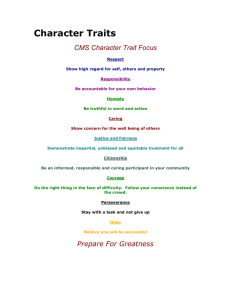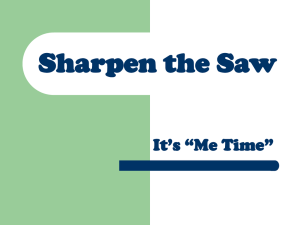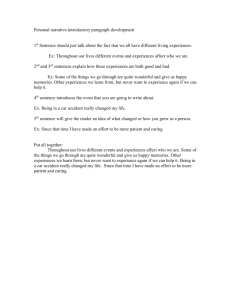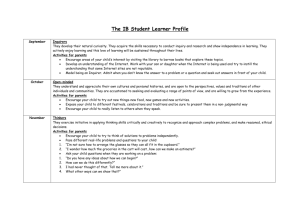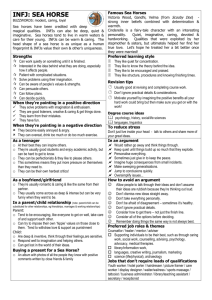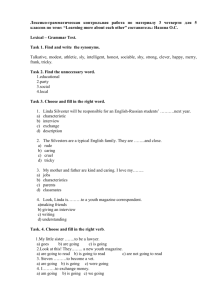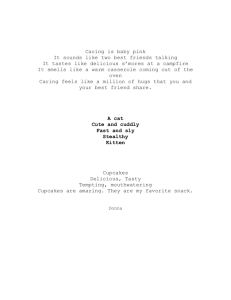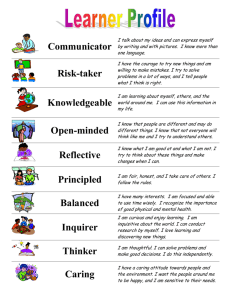From a Caring Group Participant
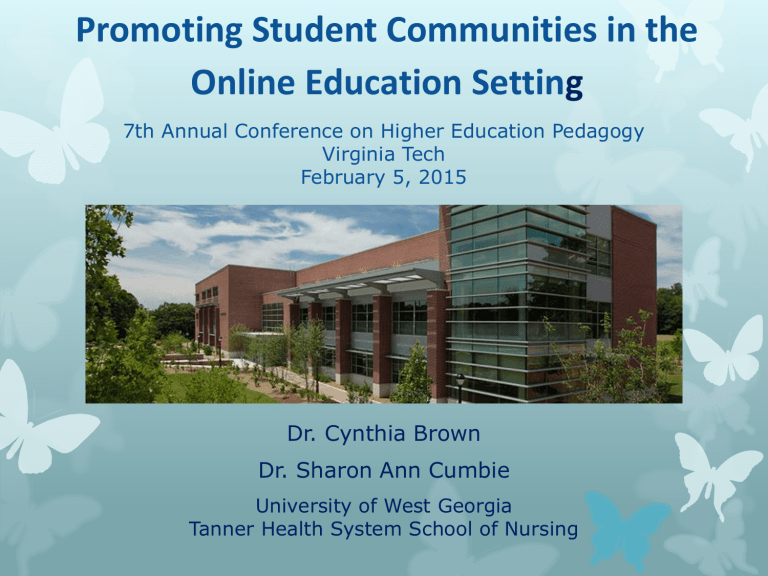
Promoting Student Communities in the
Online Education Settin
g
7th Annual Conference on Higher Education Pedagogy
Virginia Tech
February 5, 2015
Dr. Cynthia Brown
Dr. Sharon Ann Cumbie
University of West Georgia
Tanner Health System School of Nursing
Promoting Learning Communities
• Caring Framework
• Caring Groups at UWG (face-to-face)
• Caring Groups Online
• Caring Connections Online Site
Caring Framework
“…the Tanner Health System School of
Nursing frames its philosophy within the theoretical structure of caring as the essence of nursing. The faculty are committed to creating a culture of quality caring that fosters caring collaborative relationships between teachers and learners; patients, families and nurses, as well as other members of the healthcare team.”
UWG/SON Philosophy (2015)
Caring Framework
“A caring and transpersonal approach to teaching facilitates the creation of an atmosphere that will support students to develop a cohesive sense of community.”
(Cumbie & Wolverton, 2004).
Qualities of a Caring Perspective (Watson, 2008)
• Each person viewed as a unique human being.
• Person in a caring relationship perceives the other’s feelings and sets apart one person from another and from the ordinary.
• Focus on the uniqueness of self and other and the uniqueness of the moment
• Coming together in relationship is mutual and reciprocal.
Caring Groups at UWG
“Face to Face”
• Began in the undergraduate nursing program in the early 90’s in “face to face” programs
• Often connected with the student clinical groups
(10-12 students)
• Goals
• Create a safe place for students and faculty to communicate
• Allowed time for self reflection
• Provide support and encouragement to each other
• Set personal goals related to groups work
• Learn supportive/assertive communication
Guynn, M, Wilson, C., Bar, B.
, Rankin, K., Bernhardt, J., & Hickox, C. (1994)
Caring Groups at UWG
“Face to Face”
• Masters Program began in 2001 as a
Hybrid Program
• Caring Groups were “Face to Face”
• Caring Groups were initially offered only in the first semester
Caring Groups at UWG
Online
RN/BSN Hybrid Program
• Online Caring Groups for students, Spring,
2012
Master’s program
• Began as a hybrid program in 2001
• Converted to 95% online program in 2012
• Integrated online Caring Groups for cohorts beginning Fall, 2012
• MSN program 100% online in Fall, 2013
EdD Nursing Program
• Doctoral program in Nursing Education begins 100% online in Fall 2012
Elements of Socialization in
Online Caring Groups
• Increase online student engagement
• Facilitate communication
• Foster caring, collaborative relationships between faculty and students
• Provide the opportunity for students to experience and learn caring for self and others in the online environment
• Promote success
Structure of Caring Groups
• Caring Groups are introduced in the first semester of the MSN & EdD program in a course that is determined by the faculty.
• After the first semester, one course is selected each semester to accommodate the Caring
Groups.
• Caring Group “space” created in D2L learning platform via the Discussion area.
• Specific discussion topics/opportunities for a
“check-in” given to the Caring Group throughout the semester.
Structure of Caring Groups
• Course members are divided into small groups of 4-5 students in the online environment.
• Purpose of Caring Groups posted for students.
• Initially, students are asked to “check-in” with Caring Group members by posting a discussion thread related to concerns and/or excitement about starting the semester in their respective program.
Structure of Caring Groups
• Periodically during the semester, students are asked via the discussion area to
“check-in” with each other.
• Students have the opportunity to voice their concerns to group members and give and receive support from each other.
• Students are encouraged by faculty to use the Caring Group section for additional engagement with group members throughout the semester.
From a Caring Group Participant
“I viewed the video about stress in Caring Group and will probably forward it to a couple of family members. I always welcome any ideas on keeping stress to a minimum. This allowed me to reflect on my stress level and what to do to ease it up a bit. I am considering adding yoga to my routine.
I am also up for suggestions.”
Caring Groups
• Maintaining a practice of self care can be challenging for anyone
• Support from others is vital
• A commitment to self–care and finding a support system takes dedication and focus
Brown, Bishop and Bar (2013)
From a Caring Group Participant
“As nurses, we work under stressful conditions, demanding work expectations and decreased staffing.
The opportunity to discuss these issues with other nurses is critical to avoid career burnout. This discussion allows us to relieve a portion of our stress through active participation in a group like the one I am in now.”
From a Caring Group Participant
“My caring group provides support, information, and opportunity for me to express my opinions; and a way to ask for help without fear of being criticized.”
“…group members have been so wonderful; they have given me the sense to feel that I am not alone in this course.”
Successes
• Students connect and engage online
• Faculty and students model caring behaviors
• Connections that provide support throughout the program
• Described as “Life Line” especially for the first semester
• Students bringing the Caring Group model to the work place setting
Challenges
• Identifying the best way to organize the groups- self select or random selection.
• Creation of online exercises designed to promote group cohesiveness-what works best?
• Faculty interest in participating with the Caring Groups
[never enough time!].
Challenges
• Course group projects related to course work, unrelated to the Caring
Group
• Encouraging students to use their
Caring Group for support and resources-each group has it’s own
“personality”
Moving Forward
• Setting up a formalized model for Caring
Groups in the online setting to continue after the initial course.
• Getting feedback from faculty that facilitated the Caring Groups.
• Feedback from students on continuing the
Caring Groups.
• Formal orientation for new faculty related to facilitating Caring Groups.
Caring Connections
• An Online Site, external to course work for students to engage with each other.
• A separate site is established for the MSN and the EdD programs.
• All students are enrolled in the Caring
Connections site for their respective program.
• Student receive a “Welcome” email that describes the intention and purpose of the
Caring Connections site.
• Faculty facilitator is responsible for maintaining the site.
Caring Connections
• Emails reminders encouraging Caring
Connections participation are sent periodically throughout the semester by graduate faculty
• Monthly activities vary and may include:
• Self care strategies
• Inspirational Quotes
• Music
• Photographs
• Links to health-promoting websites
• Discussion board
Successes
• Celebrating student success and milestones
• Students supporting each other throughout the semester for personal and professional concerns
• Student concerns
• Family illness
• Death of loved ones
• Job Loss
• Students arranging to meet both in person and online
• Faculty support and engagement each week
From a Caring Group Participant
What a Wonderful World!
“I loved the video and song and it was so fitting for me this week. Many of you know that my son got married this past weekend. I've been a little overwhelmed with the planning and the emotion of it all, along with work and classes.
But it's been wonderful to watch everything come together. It was a spectacular weekend. Perfect weather, wonderful times with family and friends, and we ended up with a beautiful new daughter! I am so grateful for so much!”
Small Group Discussion
For those of you teaching online, or planning to teach online, what techniques would you use to engage your students?
For those of you taking an online course, what do you think helps facilitate online engagement?
Moving Forward
What innovations might you suggest to promote student engagement to develop online learning communities?
Click to play music
Love is a powerful healing energy.
Our world can benefit from more loving prayers for improved health and wellbeing.
Take some time right now to share some loving words with someone you know who may benefit from some extra kindness.
Or offer love in silent meditation - either to a specific person - or in a general way.
And during your silent meditation, send out loving light to your sojourners in the doctoral program.
Recognize the network that holds you together and gives you loving support.
And remember, Love is a powerful healing energy.
From: Rainbow Path by Kay Gardner, “The Greenwood: Heart Chakra”
References
• Brown, C.J., Bishop, M., & Bar, B. (2013). Creating and sustaining peace within for the journey of nursing leadership. Nursing Administration Quarterly, Oct-Dec;37
(4):E1-7. doi: 10.1097/01.NAQ.0000434947.57388.b3.
• Cumbie, S.A. & Wolverton, R.L. (2004). Building communities of scholars through a hologogy for online graduate nursing education. International Journal of Nursing
Scholarship. 1(1).
• Guynn, M, Wilson, C., Bar, B., Rankin, K., Bernhardt, J., &
Hickox, C. (1994). Caring Groups: A participative teaching/learning experience. Nursing & Health Care, 15(9)
476-479.
• University of West Georgia, Tanner Health System School of
Nursing Philosophy (2015) Retrieved from http://nursing.westga.edu/281_322.php
• Watson, J. (2008). Nursing: The Philosophy and Science of
Caring. rev. ed. Boulder, CO: University Press of Colorado .
